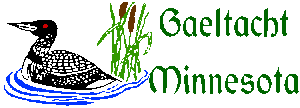
Quick Links
 |
Quick Links |
|
| GaelMinn Home | Dates: schedule, events | All Class | Tools | Amusements | ||
|
09/06/12 |
Tools |
Reprints and Study Aids |Useful Links |
Reprints and study aids are provided in Acrobat Reader format (PDF) files, which you can download and view or print from your computer if you have the Acrobat Reader from Adobe installed. (Most people who surf the 'net very much already have the plug-in installed.)
PLEASE: you are welcome to use these materials for your own study, or with students or colleagues in your study groups. Please remember, however, that Gaeltacht Minnesota has invested some effort into preparing these documents and making them available. They may not be sold, and they should only be reproduced in their original form, with the Gaeltacht Minnesota identifiers intact. Go raibh maith agat!
50 Ways to Use Your Irish: Working quick "touches" or uses of your Irish into your daily and weekly routines can enormously increase your level of practice, and significantly speed your progress in learning the language. Here are 50 tips for getting a lot more Irish practice without doing a lot more work or spending a lot of time to do it.
Start Your Own Study Group: When people complain that they don't have a group like ours near them, we tell them to start their own! We aren't kidding, and in August of 2006 An Gaeilgeoir carried an article full of tips on how to do just that. Added from May, 2009: how do you get the word out to prospective students? See our "Finding Students" reprint.
Using your Irish-English Dictionary. Beginning students are often dismayed to find that they can't find the Irish words they're trying to translate in the dictionary. Mutations and variations in spelling can make this a little more of a challenge. This article gives you some tips on how to find to "adjust" the word you're looking for, so you can find it in the dictionary.
Sample Dictionary Entries. This is a supplement to an article by Wes Koster in our August, 2009 edition of An Gaeilgeoir, in which he reviewed several portable dictionaries, as well as the main desktop versions, with recommendations as to which might be most useful for a typical student. This document simply shows typical entries for three popular portables, the Oxford Pocket, the Collins Gem, and the Foclóir Scoile/Póca. (The latter pair are generally identical in their entries, but differ in size and in some of the supplemental content.)
Pronouncing Vowel Combinations. While it is hard to describe pronunciation in text, many students get a basic handle on the consonants, and the single vowels -- but then run into combinations of two and three vowels at a time, and don't know how to say them. This article gives some general guidelines for these odd-looking combinations of vowels.
Progress In Irish Index. Many students use the little green Progress in Irishbook as a kind of grammar reference and drill book. But it is hard to find a particular point of grammar in that book. We have prepared an index of topics, by lesson number, that makes this a whole lot easier.
Buntús review. If you're working with Buntús Cainte, you may find these chapter review sheets, from Kia's class, helpful.
The November (Samhain) 2007 issue of An Gaeilgeoir included some suggestions for "Conversational Verb Study". You can download the two tools mentioned in that article here:
The RTÉ site allows you to listen to daily news broadcasts in Irish over the Web. Also check out RnaG for a schedule of radio broadcasting, live streamed over the Internet, in Irish.
Other sources of radio programs include Blas (from the BBC), Raidio Na Life, and Raidio Fáilte.
Comedian Des Bishop has gotten a lot of attention lately. Originally from America, he moved to Ireland as a teenager. Now, as an adult, he decided to learn Irish (he wasn't required to, as an immigrant). In fact, he decided to learn enough in just one year to do his stand-up routine as Gaeilge, in time for this year's Seachtain na Gaeilge celebration, and he made it.
He has a lot of interesting things to say to our typical students. On the one hand, they don't have the advantage of being able to move to the Gaeltacht. But on the other, he is someone who tackled the language as an adult, and many of his comments will resonate with our students. And he worked at it, he knew it wasn't enough to move into an Irish-speaking community, he studied hard.
Basic Book Yahoo Groups: two Yahoo dicussion Groups have recently been form to deal with the common basic texts that we use in Monday classes.
Rather than pepper our pages with links (which we don't have the time to maintain), we'd prefer to refer you to other sites where there are more keystrokes and button clicks being devoted to keeping people up to date on Irish sites. Here are a couple of interesting sites:
Comments and questions are welcome via e-mail